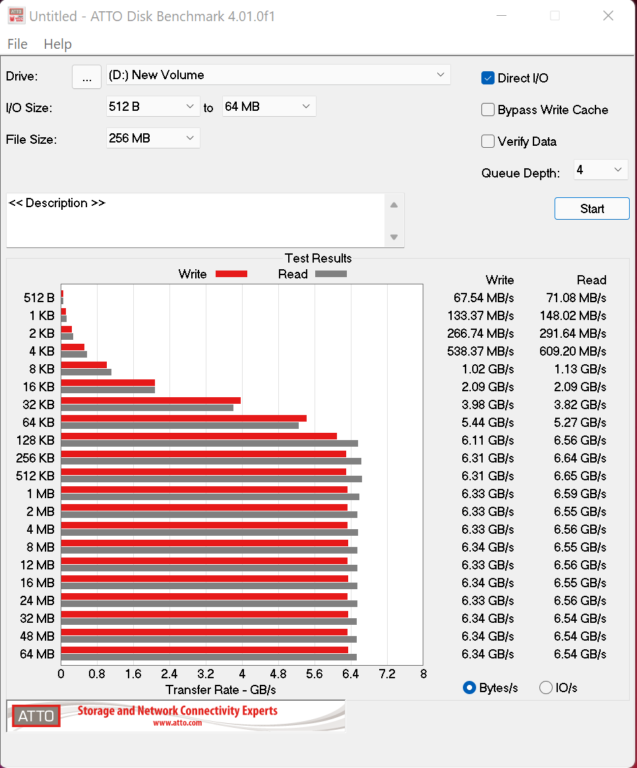ATTO Disk Benchmark is perhaps one of the oldest benchmarks going and is definitely the main staple for manufacturer performance specifications. ATTO uses RAW or compressible data and, for our benchmarks, we use a set length of 256mb and test both the read and write performance of various transfer sizes ranging from 0.5 to 8192kb. Manufacturers prefer this method of testing as it deals with raw (compressible) data rather than random (includes incompressible data) which, although more realistic, results in lower performance results.
ATTO performance is a bit lower than listed specifications with result highs of 6.59GB/s read and 6.31GB/s write.
CRYSTAL DISK BENCHMARK VER. 8.0.1 x64
Crystal Disk Benchmark is used to measure read and write performance through sampling of random data which is, for the most part, incompressible. Performance is virtually identical, regardless of data sample so we have included only that using random data samples.
THROUGHPUT
IOPS
Crystal DiskMark results for the Seagate FireCuda 530 are just about the best we have seen in our Intel Gen 4 Test Bench. Throughput highs of 7GB/s read and write as well as read and write IOPS above the million mark is outstanding.
AMD TEST BENCH QUICK LOOK
We get substantially different results, depending on whether we are testing with our AMD Gen 4 system or the newest Intel Gen 4 Bench. Intel favors low random performance and IOPS where AMD favors those high sequential results as can be seen here:
THROUGHPUT
IOPS
 The SSD Review The Worlds Dedicated SSD Education and Review Resource |
The SSD Review The Worlds Dedicated SSD Education and Review Resource | 


You didn’t mention it, but I guess this has Micron’s newest B47R Fortis 3D TLC memory that is in the Phison E18 B47R Fortis NVMe Gen 4 SSD Evaluation Sample Preview you reviewed a little while ago? If so, then I guess this would be the first commercially-released SSD with this new memory.
However, the Phison E18 B47R Fortis NVMe Gen 4 SSD Evaluation Sample Preview lists a little better in the low 4K read and write speeds. Could this be due to different firmware, or just a difference in test samples?
Great stuff, Dave.
Was about to ask the same question.
Would be cool if you could make a toplist of currently fastest ssds..